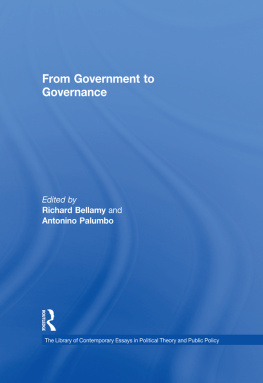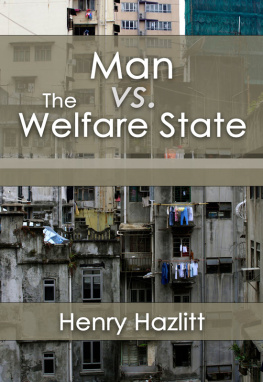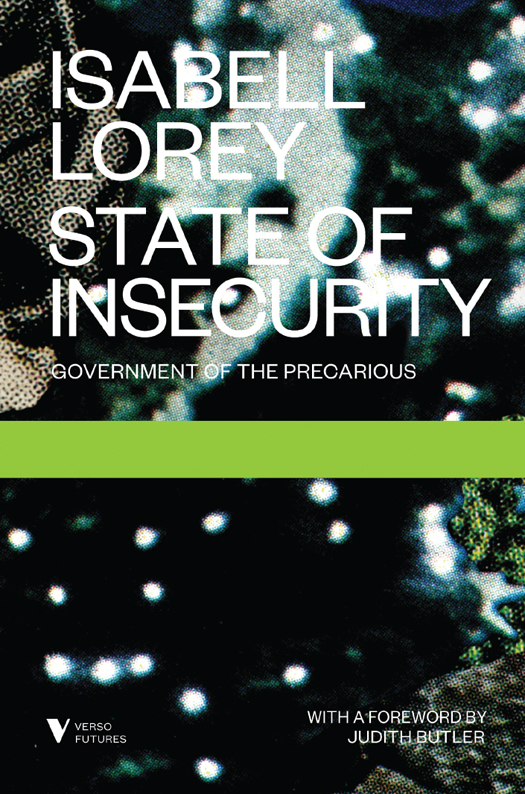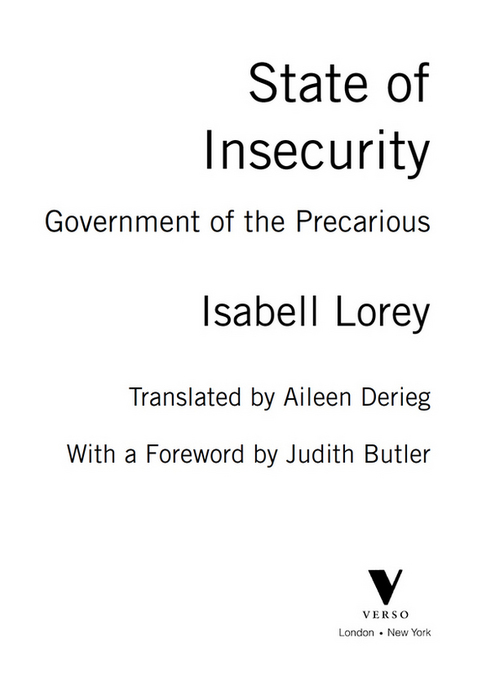Verso Futures
The law of the innermost form of the essay is heresy.
Theodor Adorno
Verso Futures is a series of essay-length philosophical and political interventions by both emerging and established writers and thinkers from around the world. Each title in the series addresses the outer limits of political and social possibility.
Also available in Verso Futures:
The Future by Marc Aug
Heroes: Mass Murder and Suicide by Franco Bifo Berardi
Dj Vu and the End of History by Paolo Virno
First published in English by Verso 2015
Translation Aileen Derieg 2015
First published as Die Regierung der Prekren
Isabell Lorey 2012
Foreword Judith Butler 2015
All rights reserved
The moral rights of the authors have been asserted
Verso
UK: 6 Meard Street, London W1F 0EG
US: 20 Jay Street, Suite 1010, Brooklyn, NY 11201
www.versobooks.com
Verso is the imprint of New Left Books
ISBN-13: 978-1-78168-596-9 (PB)
ISBN-13: 978-1-78168-595-2 (HC)
eISBN-13: 978-1-78168-597-6 (US)
eISBN-13: 978-1-78168-714-7 (UK)
British Library Cataloguing in Publication Data
A catalogue record for this book is available from the British Library
Library of Congress Cataloging-in-Publication Data
A catalog record for this book is available from the Library of Congress
v3.1
Contents
Foreword
By Judith Butler
The important contribution of this thoughtful work is to let us understand finally that precarity is not a passing or episodic condition, but a new form of regulation that distinguishes this historical time. When one claims that some populations are more precarious than others, and tries to explain that difference, one is left with the task of explaining in what precisely precarity consists, where it begins and ends, and how we understand its scope and its mechanisms. In fact, we can only identify the instances by seeking recourse to its more general form, and this leads us to a consideration of how precarity has itself become a regime, a hegemonic mode of being governed, and governing ourselves. Loreys book allows us to consider the emergence of a neoliberal form of regulation and power that is at once prefigured by Foucault and exceeds his own theory of power. The text clearly relies on Foucault for many important considerations, especially the understanding of power as it produces a subject as well as its relationship with itself. But it also introduces a new question: how do we understand precarity and its pervasive sense of insecurity as a dense site of power in subject formation? In other words, how do we understand the organization of security under neoliberal conditions as requiring and inducing precarity as a mode of life, as an indefinite trajectory, as the organizing principle for the process by which we are governed and by which we come to govern ourselves?
Loreys book works with enormous conceptual clarity to help us to distinguish among forms of precarity, their social implications, and the particular ways in which precarity names a new form of power and potential for exploitation. Drawing on the history of political sovereignty, the Marxist idea of reproductive labour, a feminist critique of ideas of masculine independence, and an analysis of neoliberal forms of induced destitution, Loreys work offers a historically and politically nuanced understanding of how new forms of power converge at the present time for new regulatory purposes. Whatever one might want to say about the transience or precarity of life itself, cast in existential terms, such claims are not separable from the social and economic organization of needs and, more particularly, the production of insecurity for the purposes of extending securitarian forms of power. Loreys work asks us to pay close attention to precarization as a process that produces not only subjects, but also insecurity as the central preoccupation of the subject. This particular form of power lays the groundwork for establishing the need for security as the ultimate political ideal, one that works to amass power within the state and corporate institutions at the same time that it produces a new kind of subject. In the place of critique and resistance, populations are now defined by their need to be alleviated from insecurity, valorizing forms of police and state control, promises of global investment, and institutions of global governance. Just as the discourse of financial crisis can and does work to shore up the need for greater managerial control of the market (and the need for an ever more expert set of capitalists), so the discourse of precarity consolidates power among those who wield the power to alternately promise its alleviation and threaten its continuation.
Loreys work involves a rethinking of the doctrine of sovereignty, offering an important reformulation of Agambens recent views on the sovereign exception. Situating her analysis within a critique of liberal political philosophy and a revised conception of biopolitics, Lorey shows how sovereignty itself becomes an instrument in the regulation and self-regulation of populations. In fact, everyone is prekarisiert by the norms that govern the idea of sovereign citizens. Their sovereignty depends on the presumption that ones person or property is perpetually threatened by the outside, and that the exercise of sovereignty thus consists in a demand for security. In a sense, contemporary securitarian regimes govern populations (and are thus bound up with biopolitics) by amplifying and redefining this basic dynamic of defending against a threat that defines liberal ideas of sovereign citizenship. Ironically, if not painfully, the idea of sovereignty implies precarization, which at once gives the lie to the traditional account of sovereign independence at the same time as it exposes its inner logic. In the terms of later modernity, the sovereign people, and the sovereign subject, are threatened by forms of illness, contagions of sexual panic, waves of criminality, possible invasions of many kinds. Thus, the need for immunization becomes paramount, and power takes the form of a subjugation by and through that need. On the one hand,the sovereign subject is markedly singular, and must be distinguished from the masses by its individualization; and yet, the subjects relation to its own life is clearly managed by large-scale forms of social and political regulation that it has adopted and now cultivates as its own practice of self-making. Indeed, the more the subject regulates him or herself, the more effectively does that broader form of regulation work taking the form of a mode of self-management that takes for granted the individuality (and the need to cultivate the individual) that is its very instrument.
This important book challenges us to imagine political mobilizations that would refuse the lure of being threatened and take a critical distance from those forms of fearfulness that make us vulnerable to exploitation. In effect, Lorey asks us to think about the alternatives to accepting fear and insecurity as the basis for a political mobilization, alternatives to accepting deliberately induced states in which we seek security at all costs. What would it mean to focus instead on the induced character of precarity, and the exploitation of insecurity? Power is imposed on the subject, and yet power is the means by which the subject relates to itself, even cultivates itself. Thus, Lorey opposes a politics of pure victimization (that would see power as only imposed from the outside) as well as the ultimate value of security (the affective investment of the regulated subject). Instead, she asks us to consider those forms of political mobilization that rally precarity against those regimes that seek to augment their power to manage and dispose of populations in other words, precarity as activism. New governmental forms engaged in the precarization of populations work precisely through cultivating forms of subjectivation and practical possibilities (















